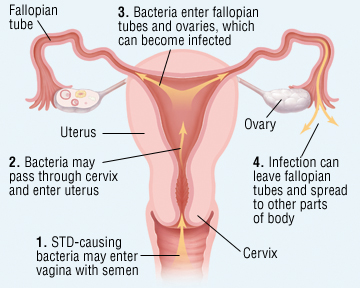 Pelvic Inflammatory Disease (PID) is a clinical syndrome of the female reproductive tract.
Pelvic Inflammatory Disease (PID) is a clinical syndrome of the female reproductive tract.
It causes damage to the fallopian tubes, uterus and ovaries and may lead to infertility and ectopic pregnancies.
The primary event which eventually leads to PID is exposure to sexually transmitted diseases such as gonorrhea or chlamydia. The cervix typically keeps out bacteria in the vagina from travelling up along the rest of the reproductive tract however when exposed to an infection which is not properly treated, this function is compromised and the micro organisms travel up through the cervix into the upper genital tract.
PID may also be a complication of abortions or pelvic procedures.
Women with PID may have symptoms ranging from subtle and mild to severe and in women with mild symptoms, several episodes of PID may go unnoticed, therefore it is very important to take note of any changes and discuss them with your gynecologist.
Symptoms of PID include:
- Dull pain or tenderness in the stomach or lower abdominal area, or pain in the right upper abdomen
- Abnormal vaginal discharge that is yellow or green in color or that has an unusual odor
- Painful and frequent urination
- Chills or high fever
- Nausea and vomiting
- Pain during sex
- Bleeding between periods
Risk factors that increase the chances of having PID include:
- Sexually transmitted diseases — especially gonorrhea and chlamydia;
- Prior episode of PID
- Having many sexual partners
- Douching may also contribute to PID by pushing bacteria into the upper genital tract and may mask the discharge that could alert a woman to seek medical attention.
Complications of PID include
- Scarred fallopian tube
- Tubo-ovarian abscess (TOA)
- Tubal factor infertility
- Ectopic pregnancy
- Pelvic adhesions
- Chronic pelvic pain
There are no tests specifically for diagnosing PID. Because the diagnosis of PID is more of a clinical diagnosis it is best to see a doctor as soon as symptoms arise. Physical examination findings to detect PID can also vary, and there is no single finding that is sensitive and specific for the diagnosis.
Several types of antibiotics can cure PID. Unfortunately however, treatment can not reverse any scarring caused by the infection. For this reason, it is very important that a woman report to her doctor immediately if she has pelvic pain or other symptoms of PID. Prompt and complete antibiotic treatment can prevent permanent damage to the reproductive organs. Patients sometimes experience relief after the first few days of treatment and don’t complete their treatment but this is wrong as the micro organisms causing the infection may not have cleared that soon. The longer a woman delays treatment for PID, the more likely she is to become infertile or to have a future ectopic pregnancy because of damage to the fallopian tubes.
So ladies, once you notice any unusual changes down there it’s best to see your Dr to get tested for any sexually transmitted diseases and recieve prompt treatment in order to prevent the major complication that is Pelvic Inflammatory Disease. Also remember to get tested and treated along with your partner to prevent reinfection.






